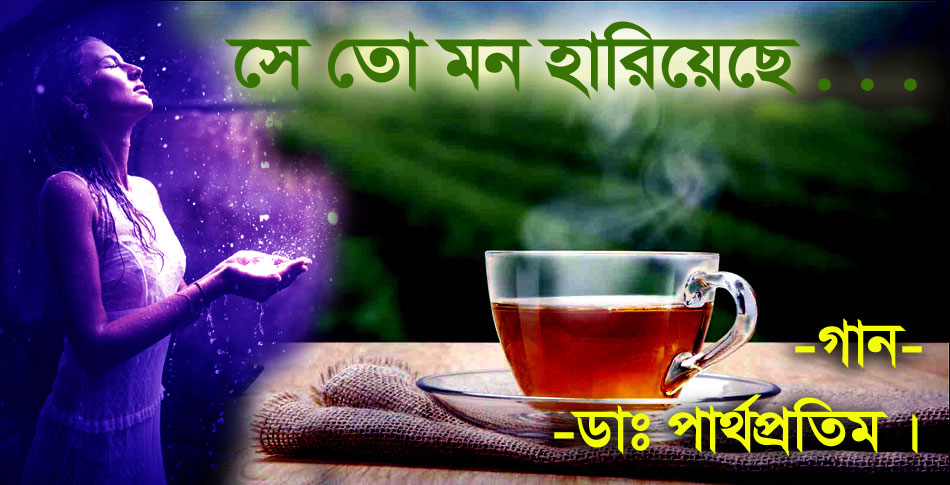

সে তো মন হারিয়েছি . . . ডাঃ পার্থপ্রতিম।
সে তো মন হারিয়েছি- সে বৈশাখে,
সবুজের গালিচায়, পথের বাঁকে,
আষাঢ়ের বারিশে- পানি টুপটাপ
বুধনির জঠরেতে কোন উত্তাপ।
রাঙাতির তীরে নামে কালো আসমান,
বুধনির কোন দর্দ হোই গেলাক গান।
প্রিয়জন দক্ষিণে রুটির খোঁজে,
তার ব্যথা বিরহিনী শালিক বোঝে।
ঝাপটা হাওয়া এসে খোলে সব দ্বার,
উদরেতে ঠোঁট রাখে মেঘ মল্লার।
উন্মন কোন মন ডানা ঝাপটায়
ভেতরে কে সাড়া দেয় আলোর আশায়।
বৃষ্টি ধারায় তার কান্না হারায়
একটি কুঁড়ি, ঐ দুইটি পাতায়।
কার দায়! কে বা সেই অশ্রু মাপে?
ধূমায়িত নাগরিক চায়ের কাপে।
সে তো মন হারিয়েছে . . . সুর- শব্দ আর্তিতে ডুয়ার্স
পশ্চিমবঙ্গের ডুয়ার্স অঞ্চল বিভিন্ন কারণে অনন্যতার দাবী রাখে। এই এলাকার অন্যতম শিল্প ‘চা’ । চা বাগিচা অঞ্চলগুলি মূলত আদিবাসী অধ্যুষিত। ‘সাদরী’ এই অঞ্চলের অন্যতম কথ্য ভাষা। স্বাধীনতার পরবর্তী কালে এই চা বাগিচা এলাকায় তেমন কোন উল্লেখযোগ্য পুঁজি বিনিয়োগ হয়নি। ফলে চা শিল্পের অনুসারী শিল্প এই এলাকায় গড়ে ওঠে নি। তাই কর্মসংস্থানের সুযোগ সীমিত থেকে সীমিততর হয়েছে। রুটি-রুজির আশায় এই এলাকার বিশেষত পুরুষেরা পাড়ি দিচ্ছে ভিনরাজ্যে। সে কারণে মা-এর ওপর চেপে বসছে সাংসারিক দায় দায়িত্ব। ধ্বংস হচ্ছে পারিবারিক ভারসাম্য।
‘সে তো মন হারিয়েছে’ এই গানটিতে তুলে ধরা হয়েছে তেমনই একটা বেদনাবিধুর পরিস্থিতি। গানের মুখ্য চরিত্র ‘বুধনি’। বুধনির স্বামী রুটি-রুজির তাগিদে পাড়ি দিয়েছে সুদূর দক্ষিণ ভারতে। বুধনি সন্তান সম্ভবা। ইতিমধ্যেই বহু যুগের ওপার হতে- ‘আষাঢ় এলো. . .’। বৃষ্টিধারায় স্নাত হচ্ছে চা বাগিচার সবুজ গালিচা। বরষা বিরহের ঋতু। বুধনি-হৃদয় বেদনাভরাতুর হয়ে উঠেছে প্রিয়জনের ভাবনায়। সে আকুতি মূর্ত হয়েছে এই গানটিতে। চা-রসিক নাগরিক সমাজের কাছে সেই আর্তি পৌঁছে দিতে এই সুর শব্দের লেফাফা।
" SE TO MON HARIYECHHE . . ." -A doleful melody of Dooars.
Dooars area of West Bengal claims its uniqueness for a wide variety of reasons. Tea industry is one of the major industries in this area. The tea garden areas are mainly populated by Adivasis. Sadri is one of the spoken languages in this region.
After independence, no such significant capital investment was made in these tea garden areas. As a result, the tea-oriented industries did'nt develop in this region. Hence, employment opportunities have declined gradually. For the sake of livelihood, people, especially men are migrating to different places . Therefore, the women are compelled to take up all the responsibilities of the family in absence of the male-adult members. Thus, the familial balance is getting disturbed. The song " SE TO MON HARIYECHHE . . ." presents the pathos of this kind of situations. The main character here is ‘Budhni’. Budhni's husband has gone to South India for bread and butter. Budhni is carrying.
In the meantime monsoon sets in. As usual the green valley is getting bathed in shower. Rainy season is a time of pain and remembrance. Budhni's heart is burden with pathos in the thought of her beloved. That longing is embodied in this song. This melody presents that yearning to the tea-loving civil society.